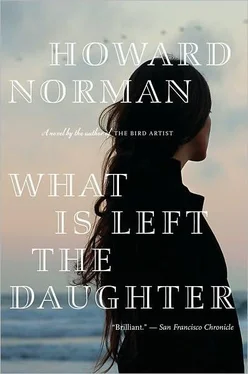In the bakery, on the morning of November 27, 1948, I said, "Cornelia, I'm moving back to Halifax."
"To your childhood house?"
"No, I need the money from rent."
"How much is it to rent a house in the city? I always wondered."
"Generally, I can't say. But mine costs fifty per month."
"It'll cost you nearly that much in petrol, since now you'll have to drive so many hours to sit here with me and eat my scones. And since my scones are sold out by nine A.M., think how early in the morning you'll have to leave Halifax."
"Rumor has it there's scones served in Halifax."
"Not mine, though."
"No, not yours."
"And as for a roof over your head?"
"I have enough savings to live on for I'd guess three months."
"Rooming house or hotel or whatnot, right?"
"Just yesterday I secured a hotel room."
"Write down the address, okay?"
I copied it out on a napkin from the return postcard I'd received. Cornelia cut off a piece of masking tape from its roll and stuck the napkin on the first page of a ledger. "My goodness," she said, "will you look at that? I've started an address book!"
We sat drinking coffee and looking out the window. It was a dreary overcast day, and if I remember correctly, one car and one pickup truck went by, and Mrs. Oleander stopped in for a sandwich. She joined our conversation, then went back to the library.
"I've kept this private," Cornelia said, "but before the war I used to take a bus into Halifax. I'd get a hotel room and I'd go to the cinema. Sometimes I'd go three nights in a row. Sometimes I'd see the same picture twice. Lately I'm considering starting up again."
"Your money's hard-earned, Cornelia. Why shouldn't you enjoy it?"
"And since you'll be in Halifax, you could escort me. Of course, that'd be like escorting someone your mother's age — may your mother rest in peace. And I'd understand if that'd be an embarrassment."
"It so happens, I did escort my mother to the cinema, on more than one occasion, in fact. Sometimes my father tagged along, sometimes he didn't. But I'd be honored, Cornelia. You were the kindest to us. Me, Tilda and Marlais. Always and by far the kindest, never a thought about yourself. You let me know when you're next visiting Halifax, and I'll expect to go to the cinema with you."
She fluttered her hand against her heart. "I'm so relieved to get that conversation over with," she said. "I might close the bakery just to rest up."
"By the way, thanks for putting me in touch with Mr. and Mrs. Leaf."
"That worked out, then, did it?"
"As we speak, they're unpacking their clothes in my house."
"The deed is still in Tilda's name, right?"
"Yes, it's in the town clerk's files."
"Well, it's unlikely she'll be back soon, if at all. On the other hand, who's to predict anything? I always liked that proverb, I think it's Jewish: 'If you want to make God laugh, tell him your plans.' Reverend Witt used it in a sermon once, back when I was attending his sermons."
"My only plan, whether God laughs at it or not, is to move to Halifax and get a paying job."
"Do you know the exact date you're leaving?"
"The Leafs want to sleep in the house starting three nights from now. I've sold them my automobile. Tilda's truck stays out behind the shed, though. I've made that clear."
"Come for breakfast every morning till you leave, okay?"
"Thank you, Cornelia. I accept your invitation."
So, Marlais, over the next couple of days I organized everything belonging to you and Tilda, bed quilts to dolls to crayons to clothes, up in the attic. Except for The Highland Book of Platitudes, which I'd honestly intended to return to the library, but made it a personal keepsake instead. On the morning of December 1, I asked Mr. Leaf to help me load the to boggan in its box onto the truck, accompany me to the bus stop in Great Village, then drive the truck back and park it behind the shed. He graciously complied. The bus was right on time.
In Halifax, I paid full passage for the toboggan to be transported first on a ship, the TSS Athenia, bound for Greece, then for France, and then sent by train to Sweden and on to its final destination of Copenhagen. I was concerned that the Kormikers no longer lived at the same address that was on their envelopes, but that was a chance I took. Nonetheless, I was relieved when, two months later, I got a letter acknowledging the toboggan's arrival. The address I'd enclosed with the toboggan: Wyatt Hillyer — resident, c/o The Evangeline Hotel, 227 Brunswick Street, Halifax, Nova Scotia, Canada.
The Photograph in Rigolo's Pub
I'M MAKING A NOTE here, Marlais, to not forget to tell you about a photograph in Rigolo's Pub.
Living on the little savings I had from wages paid by my uncle, which Cornelia had kept in her combination-lock safe at the bakery, and rent from my Robie Street house, I'd looked for employment all winter of 1948 -49. During that time I twice changed rooms in the Evangeline Hotel, each time downward in rent a few dollars a week. The Evangeline was quiet, and the manager, desk clerks and bellmen were friendly and pretty much left me alone. But the cleaning ladies, Mrs. Tompkins and Mrs. Delft, seemed to run the place. For instance, they kept no formal schedule, and my being blunt with them, that I didn't like sitting in the lobby at all hours, waiting for them to attend to my room, hardly put me better in their favor.
I applied for all sorts of work, and finally, in late June of 1949, I was hired on as a "detritus gaffer," as it was officially categorized on the payroll of Harbor Associates, which was the principal custodian of Halifax Harbor and subcontracted out specialty jobs such as detritus gaffing. I was now part of a crew made up of two women, Evie Michaels and Hermione Rexroth, and three men other than me, Tom Blackwell, Sam Kitchen and Sebastian Firth. We cleaned up around Queen's Wharf and Smith Wharf, along all the beachfronts on both the Halifax and Dartmouth sides, the whole coastline all the way out to Pennant Point. Our main task was to maneuver around in lifeboat-sized outboards, or lean from tugboat railings, gaffing in flotsam and jetsam in order to keep the lanes clear for the Halifax-Dartmouth commuter ferries, fishing trawlers and behemoth freighters. And Marlais, you can hardly believe everything that finds its way into the harbor, and I mean everything, from picture frames to lampshades to shoes. One time a crate full of brooms, another time a shipment of exotic potted plants.
We were required to itemize everything we hauled in. But the time Evie Michaels and I gathered up a set of the Encyclopaedia Brittanica— individual volumes bobbing out there under the Angus L. Macdonald Bridge — Evie said, "Say, Wyatt, you know what? My family doesn't own a complete set like this. So if you don't mind, I'm not going to write these up. I'd like to dry them out and hope they're still readable. My kids could really use them for homework."
All manner of death and near death, too. For instance, we often found waterlogged gulls, and we had a sea duck choked on a plastic necklace, a goner. Then there was a pet dachshund in a wooden crate with breathing holes. When we approached, we heard the dog barking and whimpering, so we knew it was okay. Sorry to say, we've had one suicide, too, floating face-down near the mouth of the harbor. Fishing line had twisted his fishing pole around his leg like a splint. That sight was hard to take. Again that day Evie had partnered with me. We held the poor fellow against the hull of our boat with gaffing hooks, used the walkie-talkie, and waited there until the harbor police took over. We knew it was a suicide because next morning the article in the Mail said he — his name was Russell Leminster — had left a note to that effect. "Who knows," Evie said, "what goes through someone's mind, eh? Maybe he felt a sense of order was important, so he went fishing first. Then came the next thing."
Читать дальше












